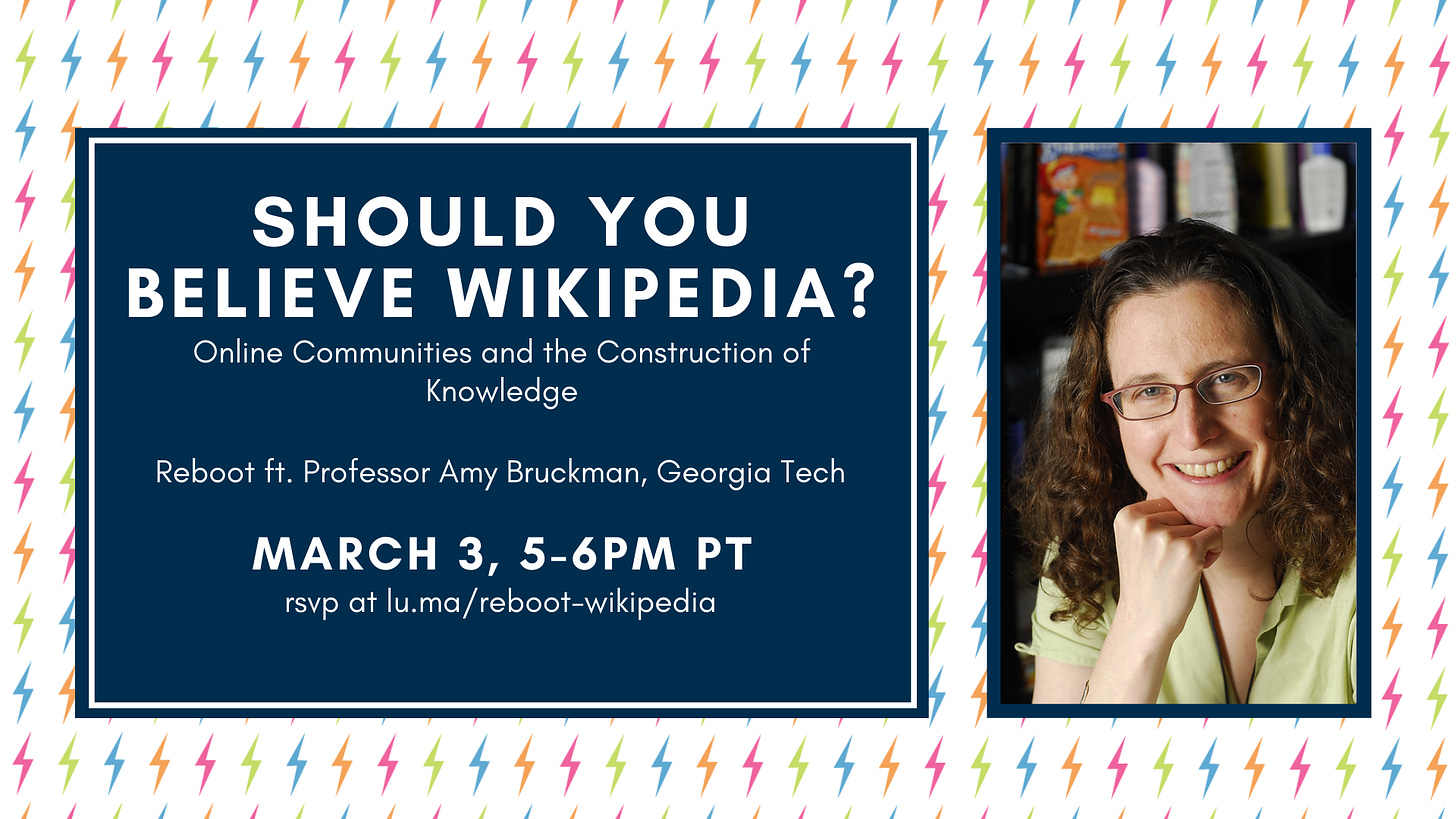⚡️ New Event: Should You Believe Wikipedia? ft. Amy Bruckman
Online communities and the construction of knowledge
Reboot is a little obsessed with Wikipedia (see Lucas Gelfond on its contributor system and an interview with Wikimedia engineer Hal Triedman on transparency in machine learning). One recurring theme is the legitimacy and veracity of information on Wikipedia, and how its contribution ecosystem might bolster or inhibit article quality—so I’m really excited to announce our next guest has written an entire book about this.
📖 Should You Believe Wikipedia? by Amy Bruckman
Our guest for next Thursday, March 3 is Dr. Amy Bruckman, Regent’s Professor in the School of Interactive Computing at Georgia Tech. She researches social computing, with interests in collaboration, social movements, content moderation, and internet research ethics.
Her new book, Should You Believe Wikipedia?, explores the relationship between internet communities and truth-making — as applied to Wikipedia, of course, but also so much more.
Join us next Thursday for a Q&A on what Wikipedia can tell us about knowledge on the internet.
📝 our take: theory, practice, and values in-between
By Deblina Mukherjee
Dr. Bruckman teaches Georgia Tech’s required CS ethics course, “Design of Online Communities”. This book is a public-facing extension of that course, and probably important for that: 101 level material that helps a reader become more conversant with academic literature and tech criticism informed by social science always seems needed. Specifically, Dr. Bruckman hones in (as the title might suggest) on the question of Should We Believe Wikipedia?, which she draws on concepts from philosophy, sociology, anthropology, design, and cognitive science to answer. It’s impressive, honestly, how organized and consistent the book is, given that arriving at this synthesis requires sifting through hundreds of years and several disciplines worth of theory.
The book is also, in short, geared towards practitioners: those among us who work on designing Wikipedia, or really any other online community, but are eager to learn about how the humanistic social sciences might think about the industry’s problems. I have no doubt Should You Believe Wikipedia will be successful with such an audience. If you want to know what the sociologist Irving Goffman might say about anonymity on your platform, if you want to read about the surprising technicality of conspiracy theorists, inflect unremarkable conversations about polarization with tidbits about epistemology, or read about how social norms, laws, and technology work together to regulate online behaviors, you will find that here.
If CS at Georgia Tech requires one ethics class, though, theory in the social sciences should require three to five—likely more. Any 101-level presentation of a social scientific concept, I think, can be dangerous: Econ 101 Fallacy abounds. If you learn about supply and demand, that is to say, it’s hard not to see it everywhere, and you might, consequently, begin believing that this graph with these two intersecting lines explain completely why the poor should starve. When all you have is a hammer, everything looks like a nail.
This is all to say that it’s incredibly difficult to do theory well. In the social sciences, theory is a constant site of contention, but you wouldn’t know that just by reading Should You Believe Wikipedia? The book’s (purposely) limited theoretical vocabulary and vague gesturing with the word “values” give it a kind of just-so, scientific-writing-for-practitioner’s-reference, textbook kind of quality. Why is Wikipedia so successful? Because of strong ties and weak ties, because of social capital, and because of pseudonymous identity—and it couldn’t possibly be any other way.
This isn’t a call for nuance in the theoretical framework of the book, to be clear. To paraphrase Kieran Healy, fuck nuance. Rather, I’m wishing for a better disclaimer about how social scientific theory works, or even more tantalizingly, how theory should work. In my opinion, social scientific theory at its best should function as provocation or parallax. But to be provoked, or to be aware of parallax, a reader needs values and politics. Yet Should you Believe Wikipedia leaves both values and politics theoretically bereft, preferring instead to use those words as a kind of blank line, where readers can fill in whatever feels good for them. It’s hard to imagine, therefore, how the sections about practical implications could possibly turn into politically-intentional praxis.
So, should you believe Wikipedia?
Spoiler alert: It depends on the page.
Deblina Mukherjee is a recent Sociology graduate from the University of Chicago.
🌀 microdoses
Always good to be reminded of the physical processes that make physical things (How a book is made, from the NYT)
Conservatives and conspiracy theorists are flocking to DuckDuckGo because… privacy and anti big tech? 🦆
Crowdwork platforms are known primarily in tech for their usage in labelling data for machine learning. They can also be used in wartime. Edit to add Mar 1: according to the WSJ, these are likely tasks from Western intelligence agencies, as Premise does lots of work with the US DoD. Client aside, this application setting was still new to me and possibly worth thinking about further.




Misinformation about the Russian invasion abounds; Twitter’s outlined an extensive response.


Ilya Kaminsky reads “We Lived Happily During the War”:
💝 closing note
There is… a lot going on right now, to say the least. We aren’t experts in foreign policy, but it goes without saying that the ongoing Russian invasion of Ukraine is abhorrent. We hope you are taking care of yourselves, are informing yourselves, and doing what you can (it may be more than you think).
See you soon,
Reboot team




